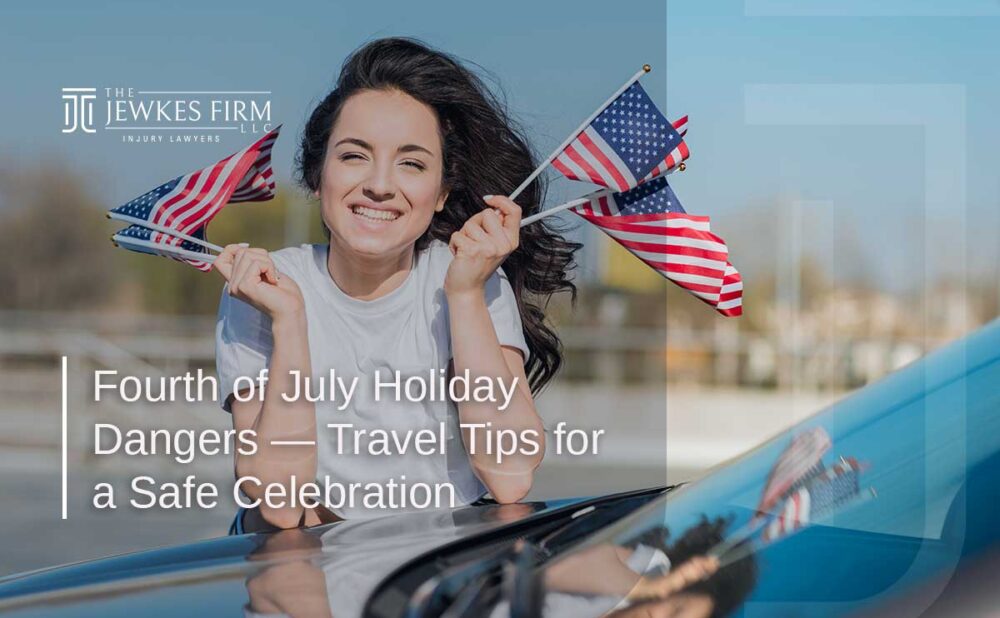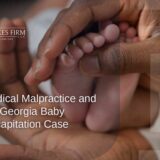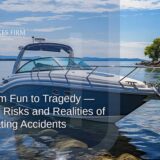Fourth of July Holiday Dangers — Travel Safety and Tips for a Safe Celebration
The Fourth of July holiday is a time for celebration, family gatherings, and patriotic displays across the United States. Each year, millions of Americans travel to celebrate Independence Day, whether by car, plane, or attending local fireworks displays. However, this festive time can also come with significant risks, particularly in terms of travel safety and the dangers associated with fireworks. This article will explore the dangers associated with driving, flying, and fireworks during the Fourth of July holiday, particularly in Georgia, and provide essential tips for staying safe.
The Importance of Fourth of July Travel
The Fourth of July is one of the busiest travel periods of the year in the United States. Over 72 million people are expected to travel during this holiday across all modes—a record high due to the three-day weekend. This figure includes those traveling by car, plane, and other modes of transportation. In Georgia, the allure of summer vacations, family reunions, and festive events draws many residents and visitors alike to travel within and outside the state.
Injured In A Car Wreck? Contact Us For A Free Consultation
Injured In A Car Wreck?

Driving — The Most Dangerous Mode of Fourth of July Travel
Driving during the Fourth of July holiday is the most dangerous form of travel, with roads seeing record-breaking traffic volumes. The combination of increased vacation travel, alcohol consumption, fatigue, and distracted driving creates a perfect storm for accidents. Nationally, July 4th consistently ranks as the deadliest day on U.S. roads, and Georgia reflects this trend with a marked rise in DUI-related crashes and traffic fatalities during the holiday period. Drivers often navigate unfamiliar routes or drive longer distances in the heat, which can strain both vehicle and driver. In Georgia specifically, rural highways and small-town infrastructure can contribute to head-on collisions or rollover accidents. To reduce these risks, safety experts recommend planning routes ahead of time, avoiding peak traffic hours, ensuring vehicle maintenance, and never driving impaired.
Why Driving is Risky on the Fourth of July Holiday Weekend
- Record-breaking traffic. The American Automobile Association (AAA) estimates that 61.6 million Americans will travel by car over the holiday weekend—a 2.2 % increase from 2024 and the highest on record.
- Crash spikes. Historically, Independence Day is the deadliest day on U.S. roads. The Insurance Institute for Highway Safety notes it has the highest traffic fatality rates annually.
- Alcohol and reckless driving. Over 40% of July 4 crash fatalities involve drunk driving, often among drivers aged 21–34.
- Unfamiliar roads and fatigue. Long holiday drives, unfamiliar routes, and driver fatigue further escalate crash risk.
Increased Traffic Congestion
One of the most significant dangers associated with Fourth of July travel is the increased traffic congestion on the roads. In Georgia, major highways such as I-75, I-85, and I-20 experience heavy traffic as families head to beaches, mountains, and other holiday destinations. According to the Georgia Department of Transportation (GDOT), traffic volumes can increase by as much as 20-30% during the holiday weekend. This congestion can lead to frustration and impatience among drivers, increasing the likelihood of accidents. High temperatures can cause tire blowouts and engine overheating. AAA recommendations advise checking tire pressure and the cooling system before long drives.
Alcohol Consumption
Alcohol consumption is another major factor contributing to Fourth of July driving dangers. Independence Day celebrations often involve barbecues, parties, and fireworks, where alcohol is frequently consumed. According to the National Highway Traffic Safety Administration (NHTSA), 40% of all traffic fatalities on July 4th involve a driver with a blood alcohol concentration (BAC) of 0.08% or higher. In Georgia, the Georgia State Patrol reported that in 2022, there were 1,500 DUI arrests over the Fourth of July weekend, highlighting the importance of safe driving practices.
Distracted Driving
Distracted driving is an ongoing issue that exacerbates the dangers of holiday travel. With the increase in traffic, drivers may be more tempted to use their phones for navigation or social media updates. According to the Georgia Department of Transportation, distracted driving is a leading cause of accidents in the state, accounting for over 14,000 crashes annually. The combination of increased traffic, alcohol consumption, and distractions can create a perfect storm for accidents during the Fourth of July holiday.
Safety Strategies for Drivers
- Plan ahead. Depart early—before 11 am on most days—to avoid peak congestion. Use navigation tools with live traffic updates.
- Avoid impaired driving. Never drive impaired; designate sober drivers or take rideshares/public transit. Stay overnight if alcohol is involved.
- Buckle up and avoid distractions. Seatbelts reduce fatality risk by 45%. Texting is illegal and dangerous.
- Maintain your vehicle. Before a trip, check coolant, tires (pressure and tread), lights, AC, and battery.
- Combat fatigue and weather risks. Take breaks every two hours. Monitor weather closely—severe thunderstorms are common across the Southeast.

GEORGIA PERSONAL INJURY LAWYER NEAR ME
Flying — The Impact of Travel Disruptions
Flying, while generally safer statistically, poses a different set of challenges over the Fourth of July weekend. Air travel spikes significantly, with record-breaking passenger numbers expected due to the long weekend. Weather-related delays are particularly common during this time of year, especially in the Southeast, including Georgia’s busy Hartsfield-Jackson Atlanta International Airport. Thunderstorms and the ripple effects of delays in other hubs can disrupt schedules and increase passenger stress. Flyers are advised to book early flights, track weather conditions, pack essentials in carry-ons, and remain flexible with their plans.
Airport Congestion
For those opting to fly during the Fourth of July holiday, airport congestion poses a different set of challenges. With millions of travelers taking to the skies, airports can become overcrowded, leading to long security lines and delays. According to the Transportation Security Administration (TSA), July 4th weekend typically sees a significant spike in air travel, with many airports reporting passenger numbers exceeding pre-pandemic levels.
Weather Conditions
In Georgia, summer weather can also impact flight safety. Thunderstorms are common in July, and severe weather can lead to flight delays and cancellations. Travelers should stay informed about weather conditions and potential delays, especially if flying into or out of Atlanta’s Hartsfield-Jackson International Airport, one of the busiest airports in the world. Hartsfield-Jackson frequently suffers major delays due to storm-related ripple effects across the region. Smaller airports in Georgia may lack alternative options, making cancellations more likely during bad weather.
Air Travel Safety and Preparedness Tips
- Book early and choose non-peak flights. Early morning flights are typically less delayed.
- Check weather frequently. Monitor both departure and arrival conditions; winter-like thunderstorms in the Northeast can ripple into the Southeast.
- Pack smart and claim your rights. Keep medications and essentials in your carry‑on. Know the airline’s rebooking/refund policies.
- Arrive early. Domestic flights: 2 hours before; International: 3 hours before.
- Monitor for alerts. Use airline apps or services like FlightAware for real-time updates.
- Have a backup plan. Rent-a-car options surge during holidays; consider alternate transport like train or bus.

Fireworks — Festive Fun, Serious Risk
Fireworks are a beloved part of the holiday but are responsible for a significant number of injuries and fires every year, many of which are preventable. Fireworks injure thousands of people nationally every year. Burns, hand injuries, and eye trauma are the most common. Many injuries occur due to mishandling or the use of illegal fireworks. Safety officials urge residents to attend professional displays rather than lighting fireworks at home. For those who choose to use them, strict precautions such as using fireworks outdoors, keeping water nearby, wearing protective gear, and never re-lighting duds are essential.
Fireworks-Related Injuries
Fireworks are a quintessential part of Fourth of July celebrations, but they also pose significant dangers. According to the U.S. Consumer Product Safety Commission (CPSC), emergency rooms treated approximately 12,500 fireworks-related injuries in 2022. In Georgia, emergency departments—particularly in Atlanta—see a sharp uptick in children suffering burns or facial injuries from fireworks during the holiday week. Even sparklers, often thought of as safe, contribute to numerous ER visits.
Fire Hazards
In addition to personal injuries, fireworks can also lead to devastating fires. Dry weather conditions in Georgia during July can increase the risk of wildfires, particularly in rural areas. The Georgia Forestry Commission reported an uptick in wildfire incidents during the Fourth of July weekend, often sparked by fireworks. It’s essential for residents to be aware of local regulations regarding firework usage, especially in areas prone to wildfires.
Safe Fireworks Practices
The American Red Cross and CPSC strongly advise watching public professional displays—stay at least 500 ft away. Georgia legalized consumer fireworks in 2015. Georgia has specific laws regarding fireworks that residents should be aware of. Local rules may vary, however, so check before buying. If you launch fireworks at home:
- Verify fireworks comply with consumer regulations and local laws.
- Use outdoors, in open spaces, clear of structures or dry grass.
- Read labels and instructions; light only one at a time, wearing eye protection.
- Never re-light duds—wait, soak them in water, and dispose.
- Keep children and pets safely away; under-15s shouldn’t launch fireworks.
- Maintain water sources like a bucket or hose nearby.
- Avoid alcohol or drugs when handling fireworks.
- Cool burns with clean water, cover with cloth, and seek medical care; do not apply home remedies.
Need a Free Consultation? Need a Skilled Attorney?
Free Consultation
Call (770) 771-5130
If you’ve been injured, you need to hire the best legal care to assist you with your claim. Get a FREE consultation today!
Non-Travel Holiday Risks — Heat, Water, and Grills
Beyond travel and fireworks, heat and water-related dangers also rise sharply during the July 4th period, especially in Georgia’s hot and humid climate. Heat exhaustion and dehydration are serious risks during outdoor events, with vulnerable populations including children and the elderly. Celebrations often involve swimming, which adds the danger of drowning or near-drowning incidents. Georgia averages several such emergencies each Independence Day. Grilling is another common activity that leads to injuries from fire, gas leaks, or food poisoning due to improper storage of perishables in the summer heat. Authorities emphasize the importance of shade, hydration, swimming in lifeguard-supervised areas, and adhering to safe food handling practices.
Heat Safety in Georgia
- Dangerous temps. July in Georgia is hot; heed warnings of heat exhaustion dangers, especially for children and pets.
- Prevent heat illness. Stay hydrated, seek shade, wear light clothing, and watch for signs like dizziness or confusion. Call 911 for symptoms of heat stroke.
Water Safety
- Water activities spike in summer. The Red Cross of Georgia recommends lifeguard-supervised areas and lifejackets, especially for kids.
- Be aware. Rip currents are real—swim parallel to escape and always float; call for help if in trouble.
Grilling and Cooking Hazards
Grilling fires and burns spike during the holiday, especially with outdoor gatherings. Here’s how to stay fire-safe:
- Grill outdoors, away from structures, with adult supervision
- Check gas grills for leaks
- Use long tools and gloves
- Keep extinguishing materials nearby
Georgia Injury and Fatality Statistics
In terms of statistics, Georgia experiences a significant increase in injuries and fatalities over the Fourth of July holiday. Traffic crashes alone can result in over a hundred deaths, many of which involve alcohol. Emergency departments treat thousands of cases related to fireworks, burns, and other holiday mishaps. The combination of increased mobility, recreational risks, and extreme weather heightens the need for vigilance. Georgia-specific data highlights the importance of regional awareness—rural areas, for instance, are more prone to fatal crashes, while cities see more fireworks-related injuries.
- Fireworks. Approximately 7,000 ER visits yearly in Georgia. Atlanta alone reports 30+ burns and 6 eye injuries mid-June to mid-July.
- Traffic. From 2018–2022, approximately 2,228 vehicle fatalities during the Fourth weekend across the U.S. Georgia, mirroring this trend, experiences approximately 100-150 holiday weekend fatalities annually, with approximately 40–60 being alcohol-related.
- Heat and dehydration. Georgia health systems treat dozens of cases of heat exhaustion and dehydration each July 4 weekend.
- Water incidents. On average, Georgia sees 5–10 drowning or water rescue events statewide each Fourth of July.

Safety Should Always Be A Priority
Fourth of July is a cherished time for patriotism and fun—but it’s also statistically one of the riskiest holidays. Heavy travel, boozy celebrations, fireworks, heat, and water activities collectively contribute to rising injury trends—nationally and in Georgia.
Safety isn’t optional—it’s essential. Whether traveling by car or plane, setting off fireworks, or simply enjoying a barbecue outdoors, the risks are real and often underestimated. Following proven guidelines dramatically reduces risks. Even simple measures—like using designated drivers, attending professional fireworks shows, and staying hydrated—can save lives.
The Fourth of July holiday is a time for celebration, but it is essential to recognize the dangers associated with travel, fireworks, and other festivities. In Georgia, the combination of increased traffic, alcohol consumption, and the use of fireworks can lead to significant risks. By following safety tips and being aware of local laws and statistics, individuals can help ensure a safe and enjoyable Independence Day celebration. Remember, safety should always be a priority, allowing everyone to focus on the joy of the holiday and the spirit of freedom it represents.
Let’s honor Independence Day by celebrating smartly—prioritizing responsibility, preparation, and awareness—so every family gets a chance to enjoy the holiday safely and with peace of mind.





